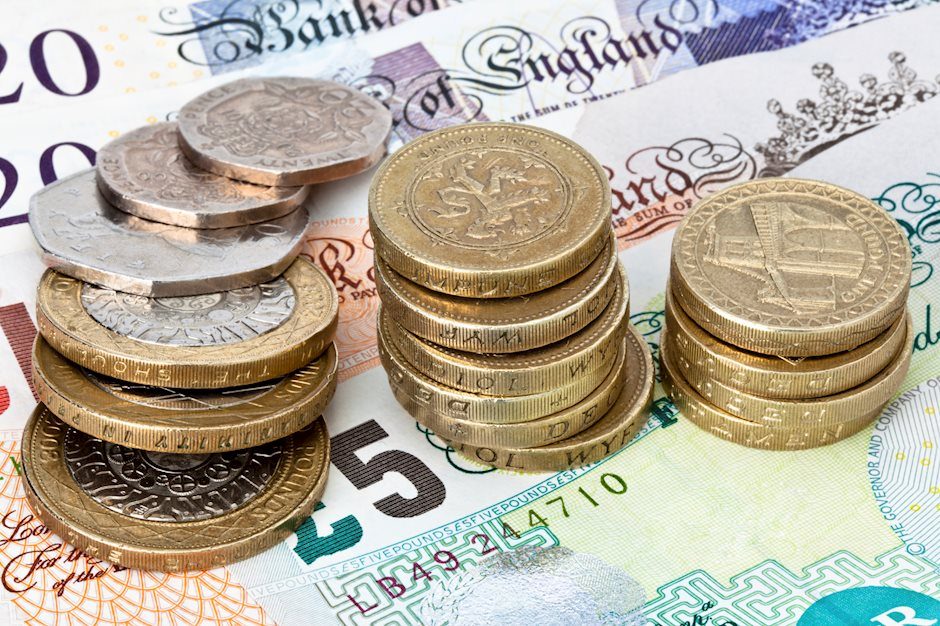Pound Sterling falls back as recession risks elevate
- Pound Sterling comes out of the woods as investors await a fresh economic trigger for further guidance.
- UK retail sales contracted in July as households switched to online shopping due to the wet season.
- British house prices drop as buyers’ home-buying ability weakens due to higher borrowing costs.

The Pound Sterling (GBP) fails to maintain recovery despite Bank of England (BoE) policymakers are expected to raise interest rates further in September’s monetary policy meeting. July’s economic indicators remained mixed: on the labor market, a hiring slowdown was offset by strong wage growth, whereas on the price front, softer headline Consumer Price Index (CPI) due to lower gasoline prices was neutralized by persistently high core inflation.
UK retail sales contracted significantly as store sales were washed out by rainy weather. However, demand at online stores increased supported by promotions, suggesting that retail demand is majorly stable. Investors will focus on preliminary PMI data for August this week for further guidance on September’s monetary policy meeting.
Daily Digest Market Movers: Pound Sterling rebounds as investors' risk appetite improves
- Pound Sterling trades lackluster around 1.2750 as investors await a fresh economic trigger for further guidance.
- Bank of England policymakers seem baffled about September’s monetary policy due to mixed readings from economic indicators in July.
- Hiring momentum in July slowed while wage growth remained strong. Core inflation steadied at high levels while headline CPI softened due to lower gasoline prices.
- UK Retail Sales for July contracted sharply due to the wet weather, which drove households to stay at home and order essentials from online stores.
- British Office for National Statistics (ONS) reported that consumers switching to online shopping because of poor weather and increased promotions led to 27.4% of retail sales taking place online in July, up from 26% in June.
- The deviation between the value and volume of retail sales remained high due to inflationary pressures.
- UK’s monthly retail sales for July declined 1.2%, underperforming already weak estimates of a 0.5% contraction. In June, Retail Sales expanded by 0.6%.
- On an annual basis, Retail Sales contracted 3.2%, more than the 2.1% decline expected and the 1.6% annual drop registered in June.
- UK’s real-estate sector continues to face the wrath of higher interest rates. Prices demanded by property sellers dropped sharply as buyers’ ability to invest in a home weakens due to rising borrowing costs.
- A Reuters poll showed that the BoE will raise interest rates to 5.75% in the current tightening cycle. The BoE has already raised interest rates to 5.25% and three monetary policy meetings are still remaining this year.
- This week, investors will focus on the preliminary S&P Global/CIPS Manufacturing and Services PMI data for August.
- According to estimates, the Manufacturing PMI is expected to fall to 45.0 from 45.3 in July. A figure below 50.0 is considered to signal a contraction in manufacturing activity. The Services PMI is also seen lower, at 50.8 against the prior release of 51.5.
- The US Dollar Index (DXY) remained sideways around 103.50 on Monday after a five-week winning spell. A power-pack action is likely in the US Dollar ahead of the Jackson Hole Economic Symposium.
- Federal Reserve (Fed) Chair Jerome Powell will deliver the economic outlook and the interest rate guidance at the Jackson Hole meeting on Friday.
- Tight labor market conditions and resilience in consumer spending indicate that the ‘last mile’ in inflation will be a hard nut to crack for Fed policymakers.
- The US Department of Labor reported lower-than-expected jobless claims. Individuals claiming jobless benefits for the first time dropped to 239K vs. expectations of 240K and the former release of 250K for the week ending August 11.
- Federal Open Market Committee (FOMC) minutes released last week delivered a clear message that the inflationary environment is still uncertain and further policy action will be dependent on the incoming data. Investors will keep an eye on August economic data for September’s monetary policy guidance.
Technical Analysis: Pound Sterling approaches 1.2800
Pound Sterling oscillates in a narrow range around 1.2750 amid mixed views about BoE’s interest rate policy. The Cable continues to face pressure from the 20- and 50-day Exponential Moving Averages (EMAs), which indicates weakness in the Pound Sterling. On a smaller time frame, the asset trade in a narrow range of 1.2700-1.2750, and a breakdown below the same is likely to trigger a sell-off.
BoE FAQs
What does the Bank of England do and how does it impact the Pound?
The Bank of England (BoE) decides monetary policy for the United Kingdom. Its primary goal is to achieve ‘price stability’, or a steady inflation rate of 2%. Its tool for achieving this is via the adjustment of base lending rates. The BoE sets the rate at which it lends to commercial banks and banks lend to each other, determining the level of interest rates in the economy overall. This also impacts the value of the Pound Sterling (GBP).
How does the Bank of England’s monetary policy influence Sterling?
When inflation is above the Bank of England’s target it responds by raising interest rates, making it more expensive for people and businesses to access credit. This is positive for the Pound Sterling because higher interest rates make the UK a more attractive place for global investors to park their money. When inflation falls below target, it is a sign economic growth is slowing, and the BoE will consider lowering interest rates to cheapen credit in the hope businesses will borrow to invest in growth-generating projects – a negative for the Pound Sterling.
What is Quantitative Easing (QE) and how does it affect the Pound?
In extreme situations, the Bank of England can enact a policy called Quantitative Easing (QE). QE is the process by which the BoE substantially increases the flow of credit in a stuck financial system. QE is a last resort policy when lowering interest rates will not achieve the necessary result. The process of QE involves the BoE printing money to buy assets – usually government or AAA-rated corporate bonds – from banks and other financial institutions. QE usually results in a weaker Pound Sterling.
What is Quantitative tightening (QT) and how does it affect the Pound Sterling?
Quantitative tightening (QT) is the reverse of QE, enacted when the economy is strengthening and inflation starts rising. Whilst in QE the Bank of England (BoE) purchases government and corporate bonds from financial institutions to encourage them to lend; in QT, the BoE stops buying more bonds, and stops reinvesting the principal maturing on the bonds it already holds. It is usually positive for the Pound Sterling.
Author

Sagar Dua
FXStreet
Sagar Dua is associated with the financial markets from his college days. Along with pursuing post-graduation in Commerce in 2014, he started his markets training with chart analysis.

















